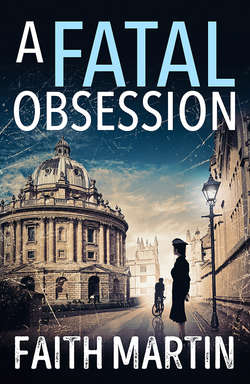Читать книгу A Fatal Obsession: A gripping mystery perfect for all crime fiction readers - Faith Martin, Faith Martin - Страница 16
CHAPTER TEN
ОглавлениеDI Jennings returned to his office with the satisfied air of a man who had just completed one hurdle and now faced several more. Not that he’d expected any trouble at the inquest, of course, but with Dr Clement Ryder presiding, there was always that chance.
The coroner was notorious for his unpredictability, a fact Jennings and the rest of the city police knew only too well. Oh, he was a very clever man, the Inspector willingly conceded, and without doubt knew his stuff – both legal and medical. Everybody knew he’d once been a surgeon, and many was the time he’d tripped up the police surgeons or other professional medical witnesses when they’d been giving evidence, catching them out on some minor point or honing in on something they’d been trying to fudge over. Which hardly endeared the coroner to them, naturally. Medicos were used to getting their own way, and it definitely didn’t please them when the man they were giving evidence to clearly knew more about medicine than they did!
Not that the police got off lightly either. Many a PC – and occasional sergeant, or even DI – had felt the cutting, sardonic lash of Dr Clement Ryder when they’d tried to pull a fast one in his court.
But the man was scrupulously fair and, to give him due credit, had a legal mind every bit as sharp as his medical one, allied to an uncanny instinct and nose for the truth, which allowed him to spot the lies witnesses slipped past the jury. And he would have none of it. Once the coroner’s inquest was called into session, there was no doubt at all who was in charge. To be fair again, he had a real passion for seeing justice done.
Perhaps, Jennings thought wryly, therein lay the problem. Sometimes Dr Clement bloody Ryder thought he knew better than the police did. Four times in the past, he’d strongly called into question the line the police were trying to take in a case. More annoyingly still, in all four cases he’d eventually been proved right – to the intense embarrassment of the police team investigating the cases. And while he and his colleagues knew that a coroner’s jury, made up of ordinary members of the public, could be steered, very gently and carefully, into giving the verdict the police favoured, you didn’t try that on when Dr Ryder was overseeing the case.
Still, so far, Harry Jennings had never fallen foul of the egotistical, astute coroner, and would take pains to make sure he never did. The last thing he wanted to do was lock horns with the likes of Dr Ryder. The man might be a menace, but he also had friends in high places.
So now, as he sat down behind his desk, he breathed a gentle sigh of relief that the McGillicuddy inquest had gone so smoothly and, pulling open a file, began rereading the latest findings on the Deering case.
When Sir Marcus had finally come clean about what might have been behind the chilling anonymous letters, he’d had his team investigate the fire at once. At first it had seemed such an obvious and overwhelming lead; but the more they’d gone into it, the less likely it seemed. As Sir Marcus had insisted, it was hard to see how anyone could blame him for what had happened.
The facts were simple. When Sir Marcus had left university, nearly thirty years ago now, he’d taken a position as personnel manager at a large retail warehouse in Birmingham. The warehouse had been the repository for a wide range of merchandise that quickly found its way to shops in the area, including everything from bed linens and ceramics, to gas tanks for domestic use, to wooden furniture and cleaning agents. In other words, several items that were highly flammable.
One autumn day, when there had been a brisk wind blowing, a forklift operator, taking a break and smoking a cigarette, had accidentally started a fire that had quickly swept through the large building, killing three and badly burning five more people, including the forklift operator. The blaze had been made worse by the high winds, which had helped sweep it to all areas, creating a veritable inferno.
The company had admitted responsibility, and their insurance had made payments to the next of kin of those who had died, and had also made some reparation to the injured – although, at the time, the victims hadn’t been overly impressed with the generosity of the payments.
The fire had naturally been thoroughly investigated, and been adjudicated an accident. The forklift driver had been spared prison on account of his serious burns, but had died barely a year later – some said of guilt, while others insisted he’d drunk himself to death.
But as Sir Marcus had pointed out, no reasonable person could ever have said or believed that he was in any way personally to blame for the tragedy. He wasn’t the employee in charge of health and safety, he wasn’t a fire marshal, and hadn’t even been at work on the day of the accident. In fact, the only way he could be said to have any connection to it at all was that, as the personnel officer, he had been responsible for the hiring of the forklift driver. But even then, the man had had a spotless record and, before the accident, had certainly not been known to be a heavy drinker. So how could anyone hold him responsible? And why now, after all this time, would they be seeking retribution?
